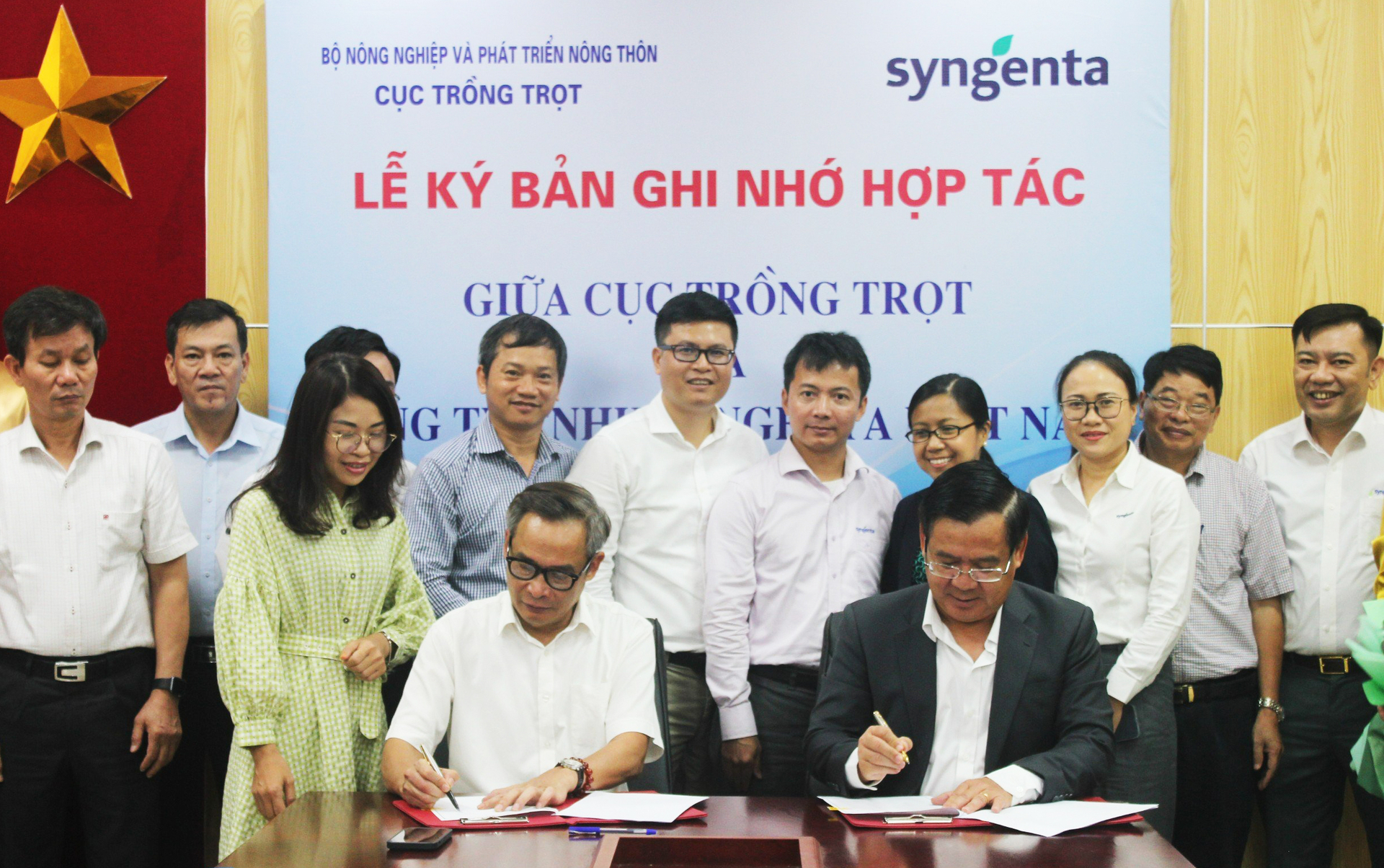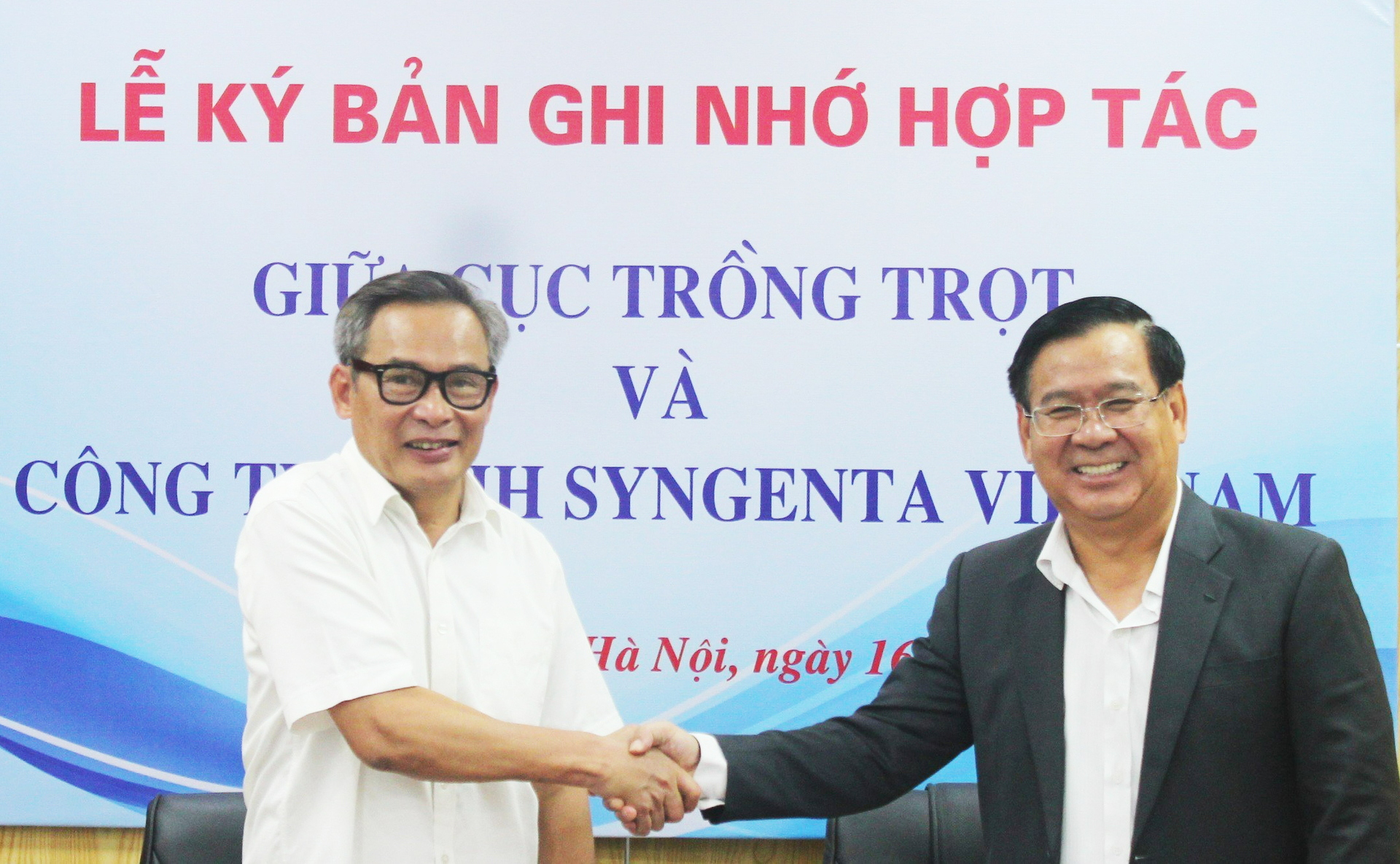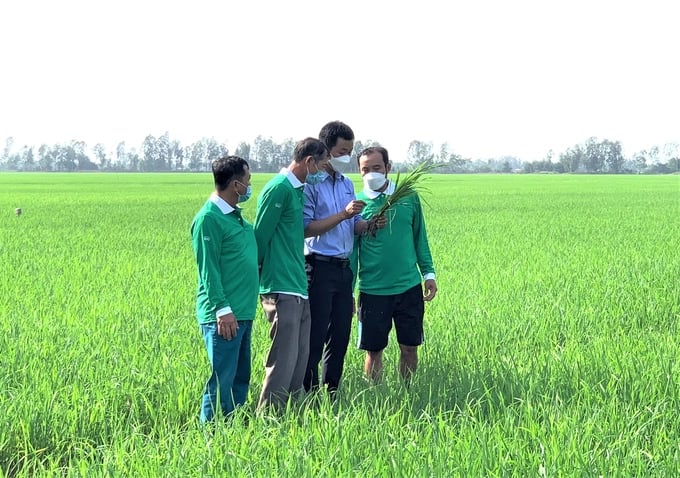May 22, 2025 | 20:49 GMT +7
May 22, 2025 | 20:49 GMT +7
Hotline: 0913.378.918
May 22, 2025 | 20:49 GMT +7
Hotline: 0913.378.918
On August 16th, at the Department of Crop Production (Ministry of Agriculture and Rural Development), the Department of Crop Production and Syngenta Vietnam Company Limited held a signing ceremony for a memorandum of understanding to strengthen cooperation in training, research, and technology transfer, aiming to achieve sustainable development in the field of crop cultivation during the period 2023 - 2028.

Memorandum of Understanding signing ceremony between the Department of Crop Production and Syngenta Vietnam. Photo: Department of Crop Production.
Crop cultivation is one of the key sectors of agriculture. In Vietnam, the products of crop cultivation not only meet domestic consumption needs, contributing to national food security goals but also gradually expand into exports, making a significant contribution to the Vietnamese economy.
However, climate change, market fluctuations, and shifts in consumer trends have deeply impacted the agriculture sector in general, and crop cultivation in particular. In this new context, to increase productivity and production in a sustainable direction, it is necessary to enhance scientific research activities to apply advanced cultivation techniques, and utilize new crop varieties that are better adapted to climate change, and suitable for local soil and climatic conditions. The goal is to develop an ecologically safe, secure, and sustainable crop cultivation sector.
With the favorable strength of being a leading global group in the agrochemical and seed sector, as well as over 30 years of experience in research, development, and trade of seed varieties in Vietnam, Syngenta places great importance on collaborating with partners in selecting, developing, and producing high-value crop varieties. These varieties possess valuable traits and are suitable for Vietnam's climate and cultivation conditions, with the aim of transferring them to farmers.

Mr. Nguyen Nhu Cuong, Director of the Department of Crop Production (left) and Mr. Tran Thanh Vu, General Director of Syngenta Vietnam Co., Ltd. signed a cooperation agreement. Photo: Department of Crop Production.
- Enhancing the collaboration of expertise: Advanced training to enhance expertise in specialized fields and introduce new technical approaches applied to crop variety selection, cultivation, and sustainable and safe production.
- Training and guidance for expanding production, and implementing the efficiency assessment model for new crop varieties considering local cultivation practices, climate conditions, and soil characteristics. These new varieties will be transferred to farmers to increase productivity, quality, and cultivation efficiency.
- Training and guidance for provinces and cities to implement region-specific cultivation area codes nationwide. This aims to monitor and control production conditions, product quality, and traceability of agricultural products.
Through this collaboration, both parties aim to achieve positive outcomes for the crop production sector. This partnership is expected to enhance productivity, crop quality, and economic value for farmers, contributing to the sustainable development of agriculture.
Beyond bolstering the immediate livelihoods of farmers, this collaboration embodies a broader commitment to the long-term well-being of the agricultural sector. The integration of responsible cultivation practices is set to nurture a thriving ecosystem where crop cultivation harmonizes with environmental sustainability. As these advancements become deeply ingrained within the fabric of farming communities, they will contribute to the realization of a robust, resilient, and prosperous agricultural sector that stands the test of time.

The technical staffs of Syngenta Vietnam are ready to accompany and stand by with the farmers. Photo: TL.
Speaking at the signing ceremony, Mr. Nguyen Nhu Cuong, Director of the Department of Crop Production, stated that the collaboration between the Department of Crop Production and Syngenta Vietnam is oriented towards the benefits of farmers and the sustainable development of agriculture. "We will promote the dissemination and application of modern cultivation methods into production models. This will facilitate the transfer of new technologies to improve the livelihoods of farmers, build responsible cultivation awareness, and aim for a sustainable agricultural sector in Vietnam," emphasized Mr. Cuong.
Addressing the signing ceremony, Mr. Tran Thanh Vu, General Director of Syngenta Vietnam, mentioned that Syngenta places strong emphasis on collaborating with research institutes and agricultural management agencies to enhance cooperation and bridge the gap between research and application. The signing of the memorandum of understanding between Syngenta and the Department of Crop Production aims to leverage the strengths of both parties, accelerate the transfer of new technologies into production, enhance the value of agricultural products, and contribute to an ecologically sound, safe, and sustainable agricultural sector.
Translated by Nguyen Hai Long
![Reducing emissions from rice fields: [2] Farmers’ commitment to the soil](https://t.ex-cdn.com/nongnghiepmoitruong.vn/608w/files/news/2025/05/05/dsc08881jpg-nongnghiep-140632.jpg)
(VAN) Clean rice cultivation model in Thuong Tan commune, Bac Tan Uyen district, is assisting local residents in achieving sustainable agriculture by substantially reducing costs, increasing productivity, and protecting the environment.

(VAN) At the conference to disseminate Resolution No. 68, AgriS introduced its digital agricultural ecosystem and reaffirmed its commitment to accompanying the Government in promoting private sector development and sustainable agriculture.

(VAN) 'Blue Ocean - Blue Foods' initiative is designed to restore marine ecosystems and establish sustainable livelihoods for local communities by cultivating a minimum of 1,000 hectares of cottonii seaweed in the first three years.
/2025/05/21/4642-3-112707_603.jpg)
(VAN) The V-SCOPE project has made direct contributions to three out of six pillars of the Comprehensive Strategic Partnership between Vietnam and Australia.

(VAN) Facing the threat of rabies spreading to the community, Gia Lai province urgently carries out measures to vaccinate dogs and cats on a large scale.

(VAN) Disease-free livestock farming not only protects livestock herds but also stabilizes production and livelihoods for many farmers in Tuyen Quang.

(VAN) Japan's grant aid project contributes to capacity building, promoting organic agricultural production, and fostering sustainable community development in Dong Thap province.